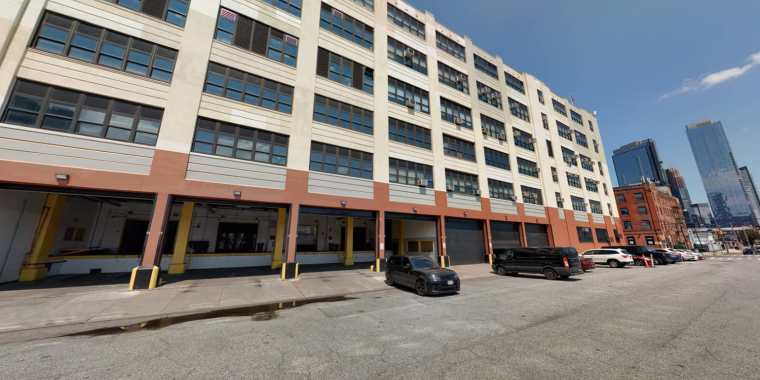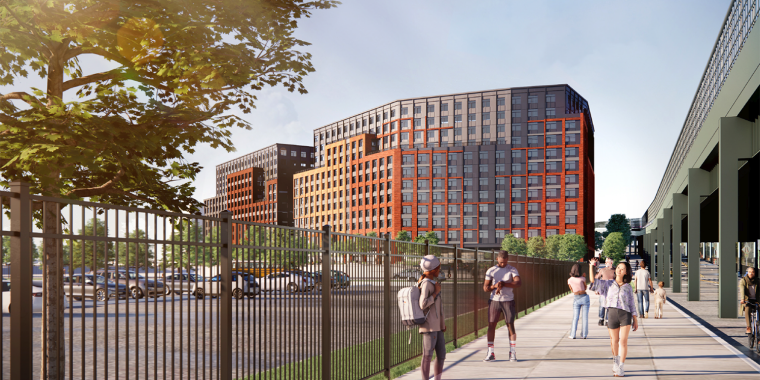NYCEDC Releases New Report Highlighting Higher Education’s Critical Role in NYC’s Economy, Start-up Creation, and Economic Mobility

Data Finds That New York City Higher Education Sector Contributes $35 Billion Annually and Employs 140,000 People
New York City Leads Nation in Attracting Young Talent with 490,000 Recent College Graduates Working in the City
In the Last Two Years, Leading Academic Institutions Have Established or Grown Their Presence in NYC Because of the City’s Unparalleled Access to Talent
NEW YORK, NY—New York City Economic Development Corporation (NYCEDC) today announced a new report, Academia in New York City: Shaping the Future of NYC’s Economy, offering key metrics around the scope, size, and economic impact of New York City’s higher education sector. Generating $35 billion annually and employing 140,000 people, the higher education sector plays a critical role in New York City’s economy and attracting young diverse talent. New York City leads the nation in attracting young talent with the number of currently enrolled students and recent graduates working in the city totaling nearly one million. In addition to the economic impact, colleges and universities promote economic mobility, drive research, create new companies and startups, strengthen the workforce, and serve as a key space for innovation and creativity in the city’s future-focused sectors.
Key takeaways from the report include:
- New York City higher education employs over 140,000 people and contributes $35 billion annually in economic impact. The higher education sector is similar in size to construction and real estate, which employ 141,000 and 137,000, respectively.
- With more than 100 higher education institutions and a student population of over 503,000, universities and colleges are an important part of New York’s economic and physical fabric. The New York metro has more academic institutions than any other metro area in the country.
- These institutions have awarded on average 150,000 degrees each year over the past decade, with degrees increasingly shifting toward STEM.
- From 2021 to 2024, about 490,000 graduates from across the country ended up in New York, twice the number who chose Los Angeles, the second most popular destination.
- 66 percent of students that graduated from NYC metro schools between 2014 and 2024 are working in the region today.
- Since 2001, 4,800 patents have been issued from university research in NYC, a majority of which are in the life sciences.
- Between 2010 and 2021, nearly 500 startups have been formed by NYC university researchers or alumni.
- 13 of the top 20 colleges nationally for economic mobility are located in NYC, making NYC academic institutions among the most effective in enabling upward mobility.
“This report makes one thing clear: with over 100 institutions of higher education and more than 500,000 students, New York City is a university town,” said First Deputy Mayor Maria Torres-Springer. “Thank you to the Economic Development Corporation for this compelling analysis and clear description of the ways that academic institutions play a foundational role in every part of city's large and diverse economy, from talent attraction and retention, to knowledge creation and commercialization, to employment and skills development.”
“There is no better classroom than the City of New York. That is why our academic sector continues to thrive pumping 35 billion in annual economic impact into our local economy,” said NYCEDC President & CEO Andrew Kimball. “Half a million college and university students and another half a million recent graduates provide fresh talent, open new businesses, and create good-paying jobs. Through this report, NYCEDC is uplifting this rarely told but remarkable New York story and will continue to partner with our colleges, universities, and research institutions to create jobs, fuel innovation, and drive economic mobility.”
NYCEDC works closely with local academic institutions and those across the globe to establish or expand their operations in New York City. Cornell Tech serves as an early example of NYCEDC’s investment in academia, and the benefits that a top tier institution can bring to the city and its economy. In addition to bringing more young talent to the city, Cornell Tech has spun out 100 startups since its inception and been at the forefront of innovation in AI. According to its recent impact study, by 2030, Cornell Tech is projected to generate $1.5 billion in economic impact, build an NYC alumni network of 2,300 people, and create 7,000 jobs.
There are additional examples that demonstrate the city’s attractiveness to major academic institutions and the value that academic expansions can bring to the city’s economy. As outlined in the report, Yeshiva University, New York University, and Pace will be expanding their existing footprints, while non-New York City-based institutions including, Vanderbilt University, and Stonybrook University have opened or announced plans to open new campuses or research hubs in the city. New York University has is working with Korea Advanced Institute of Science and Technology (KAIST) on cutting-edge AI collaboration, while Columbia, Rockefeller, and Yale Universities will partner with the Chan Zuckerberg Initiative to launch a new biomedical research hub. Northeastern and Marymount are pursuing a merger that will establish an additional Northeastern campus in New York City.
“This report affirms the critical contributions of higher education to New York’s economic prosperity today and for generations to come. We thank the New York City EDC for its partnership and shared commitment to building a more prosperous and inclusive city,” said CUNY Chancellor Félix V. Matos Rodríguez. “CUNY, which accounts for more than one-quarter of the city’s higher education workforce and nearly half of its students, is proud to serve as a cornerstone of the sector and an unparalleled source of educational opportunity and access for all New Yorkers.”
“There is a place at SUNY for every New Yorker, and some of the greatest educational opportunities and spaces in New York City, from the halls of the world-renowned Fashion Institute of Technology to the state-of-the-art ship and gorgeous shoreside campus of SUNY Maritime to our celebrated medical programs at SUNY Downstate and SUNY College of Optometry,” said SUNY Chancellor John B. King Jr. “Our colleges and universities provide a high-quality education, workforce training, and employment opportunities that bring the most talented individuals to the world’s greatest city to study. SUNY’s impact will only grow with the exciting potential of the New York Climate Exchange on Governors Island, led by anchor partner Stony Brook University.”
“Vanderbilt University is thrilled to join New York's rich ecosystem of colleges and universities, all of whom play a crucial role driving a city and region’s economic growth,” said Vanderbilt University Provost and Vice Chancellor for Academic Affairs C. Cybele Raver. “We train the next generation of leaders, attract the brightest minds from around the world, and create new knowledge through path breaking research. With our enhanced presence in the city, Vanderbilt is delighted to explore and create immersive opportunities for our community uniquely available here and to partner with the institutions that are the fabric of the city’s vibrant innovation ecosystem.”
“For more than 100 years, Cornell has been part of the fabric of New York City’s five boroughs,” said Cornell University Interim President Michael I. Kotlikoff. “Today, faculty, staff, and students at Weill Cornell Medicine, Cornell Tech, and within Cornell’s many NYC-based programs deliver research-based solutions that improve the lives of millions of New York City residents, while strengthening its diverse industries. We are proud to be part of a vibrant community of colleges and universities whose contributions attract world-class talent, create high-paying jobs, and enrich the city.”
“New York is one of the world’s greatest cities, with an unrivaled and increasingly diverse economy,” said Northeastern University President Joseph E. Aoun. “As we prepare for the A.I. revolution, citizens will need to reskill and upskill themselves constantly. We look forward to partnering with industry, government, and civic leaders to bring Northeastern’s experiential learning programs to New York and the surrounding region.”
“Universities and cities are symbiotic partners. Both are engines of creativity, culture, economic growth, and the advancement of knowledge,” said The New School President and University Professor Joel Towers. “Together we nurture the arts, create opportunity, innovate in science, technology, design, and business while providing pathways for people of all backgrounds to thrive in the city of today and the one we will build for tomorrow. New York City has always invested in its universities, and its universities are equally Invested in a prosperous, resilient, and dynamic future for the global metropolis we call home. This report reveals the profound benefit universities bring to the city and it highlights our capacity, working together, to confront the most pressing challenges of our time.”
NYCEDC used a variety of primary and secondary data sources for this analysis, with the goal of building the most comprehensive view possible of the higher education ecosystem in New York City. Employment figures come from the New York State Department of Labor Quarterly Census of Employment and Wages. Enrollments and completions data are from National Center for Education Statistics Integrated Postsecondary Data System.
“New York City’s research institutions work closely together to bring cutting-edge scientific innovations out of the lab and into the market to save and improve human lives,” said Columbia University Senior Vice President for Applied Innovation Orin Herskowitz. “Increasingly, the dozens of startup companies launched every year out of the city’s academic research centers are choosing to start and grow in NYC, a tribute to the dynamic innovation ecosystem that the NYC Economic Development Corporation, the universities, and so many others have been striving to create.”
“New York City is a leader in the fields of technology, and maybe surprisingly, all aspects of aviation,” said Vaughn College President and Chief Executive Office Dr. Sharon B. DeVivo. Vaughn is a private, non-profit college in Queens offering degrees in aviation, engineering, technology and management. “Vaughn prepares students to fill high-demand careers with strong industry connections that lead to internships and employment. By responding to the needs of the industries we serve and supporting students who are from underrepresented and under resourced communities, we are building the pipeline of professionals who have amazing career trajectories and change their own lives and the lives of their families.”
“For over 170 years, Manhattan University has been a vibrant institution and home to many students from the metropolitan area,” said Interim Manhattan University President Frederick Bonato. “We believe it is vital for academia and industry to join forces to ensure that this region develops the leaders to meet the challenges and opportunities that lie ahead, sparks the creativity that opens new avenues of entrepreneurship, and continues to enhance the vibrancy that is New York City.”
“Now more than ever, New York City's higher education institutions serve as vital economic engines that attract talented students, drive innovation across disciplines, and stimulate workforce development,” said Pratt Institute President Frances Bronet. “As one of the premier schools of creative inquiry, art, architecture, planning, and design, Pratt Institute has a longstanding commitment to partnering locally across sectors to help build an inclusive economy by developing early learning pathways, including the public Design Works High School that we co-created and our Center for Art, Design, and Community Engagement K–12. With our research space at the Brooklyn Navy Yard and by actively collaborating across the city, including co-founding The New York Climate Exchange, among other initiatives, we prepare our students to make significant contributions by challenging them to problem-solve through an inclusive design process to make a more vibrant and just New York City.”
“Proud of our New York City roots and location, St. John's University prepares students for personal and professional success,” said St. John's University President Rev. Brian J. Shanley, O.P., Ph.D. “We remain committed to forging a path of mobility and opportunity for those who want to make a difference in our city and the world. We proudly serve as an economic mobility engine and a significant contributor to economic growth in the city and state. Our students and accomplished graduates are a continual source of school pride and a powerful reminder of the formidable promise and possibilities of the New York St. John's educational experience.”
“If there is a secret sauce behind New York City’s remarkable economic success over the past few decades, it’s the consistent ability to attract, retain, and produce highly talented young people,” said Center for an Urban Future Executive Director Jonathan Bowles. “The city's many excellent universities are at the heart of that. It's great to see NYCEDC's efforts to support and strengthen this critical foundation for the city's future economic growth.”
“The New York Climate Exchange was established to pioneer a new model of collaboration between NYC-based educational institutions, helping to dramatically expand our long-standing local thought leadership on the most pressing issue of our time,” said The New York Climate Exchange CEO Stephen Hammer. “We applaud reports like this which reinforce the essential role that local colleges and universities play in helping to drive the expansion of New York’s green economy, which is poised to become of the largest and most influential in the world.”
About NYCEDC
New York City Economic Development Corporation is a mission-driven, nonprofit organization that works for a vibrant, inclusive, and globally competitive economy for all New Yorkers. We take a comprehensive approach, through four main strategies: strengthen confidence in NYC as a great place to do business; grow innovative sectors with a focus on equity; build neighborhoods as places to live, learn, work, and play; and deliver sustainable infrastructure for communities and the city's future economy. To learn more about what we do, visit us on Facebook, Twitter, LinkedIn, and Instagram.


